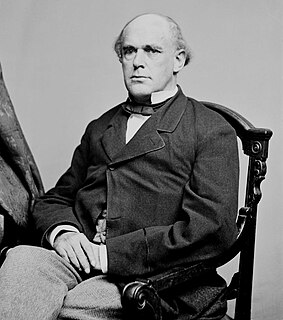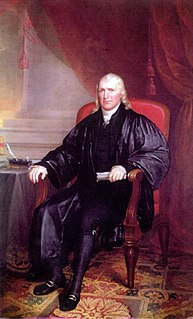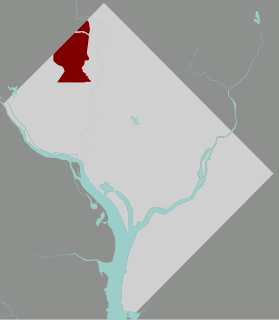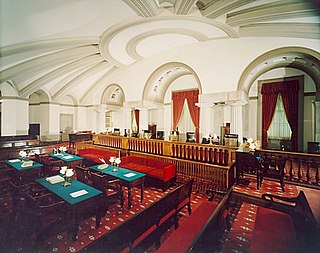
Chevy Chase is the name of both a town and an unincorporated census-designated place that straddle the northwest border of Washington, D.C. and Montgomery County, Maryland. Several settlements in the same area of Montgomery County and one neighborhood of Washington, D.C. include "Chevy Chase" in their names. These villages, the town, and the CDP share a common history and together form a larger community colloquially referred to as "Chevy Chase".

Salmon Portland Chase was a U.S. politician and jurist who served as the sixth Chief Justice of the United States. He also served as the 23rd Governor of Ohio, represented Ohio in the United States Senate, and served as the 25th United States Secretary of the Treasury. Chase was therefore one of a few US politicians who served in all three branches of the federal government.

J.P. Morgan Chase & Co. is an American multinational investment bank and financial services company headquartered in New York City. JPMorgan Chase is the largest bank in the United States, and is ranked by S&P Global as the sixth largest bank in the world by total assets as of 2018, to the amount of $2.534 trillion. It is the world's most valuable bank by market capitalization and was named one of the top stocks to buy in 2019.

Real tennis – one of several games sometimes called "the sport of kings" – is the original racquet sport from which the modern game of tennis is derived. It is also known as court tennis in the United States, formerly royal tennis in England and Australia, and courte-paume in France.

Samuel Chase was an Associate Justice of the United States Supreme Court and a signatory to the United States Declaration of Independence as a representative of Maryland. He was impeached by the House on grounds of letting his partisan leanings affect his court decisions but was acquitted by the Senate and remained in office.

Morrison Remick "Mott" Waite was an attorney, judge, and politician from Ohio. He served as the seventh Chief Justice of the United States from 1874 to his death in 1888. During his tenure, the Waite Court took a narrow interpretation of federal authority related to laws and amendments that were passed during the Reconstruction Era to expand the rights of freedmen and protect them from attacks by vigilante groups such as the Ku Klux Klan.
Hollingsworth v. Virginia, 3 U.S. 378 (1798), was a case in which the United States Supreme Court ruled early in America's history that the President of the United States has no formal role in the process of amending the United States Constitution and that the Eleventh Amendment was binding on cases already pending prior to its ratification.
A number of cases were tried before the Supreme Court of the United States during the period of the American Civil War. These cases focused on wartime civil liberties, and the ability of the various branches of the government to alter them. The following cases were among the most significant.
The Midnight Judges Act represented an effort to solve an issue in the U.S. Supreme Court during the early 19th century. There was concern, beginning in 1789, about the system that required the Justices of the Supreme Court to "ride circuit" and reiterate decisions made in the appellate level courts. The Supreme Court Justices had often voiced concern and suggested that the judges of the Supreme and circuit courts be divided. President Thomas Jefferson did not want the judiciary to gain more power over the executive branch.
Texas v. White, 74 U.S. 700 (1869), was a case argued before the United States Supreme Court in 1869. The case involved a claim by the Reconstruction government of Texas that United States bonds owned by Texas since 1850 had been illegally sold by the Confederate state legislature during the American Civil War. The state filed suit directly with the United States Supreme Court, which, under the United States Constitution, retains original jurisdiction on certain cases in which a state is a party.

Chevy Chase is a neighborhood in northwest Washington, D.C. It borders Chevy Chase, Maryland, a collection of similarly affluent neighborhoods.

James Hadley Chase was an English writer. While his birth name was René Lodge Brabazon Raymond, he was well known by his various pseudonyms, including James Hadley Chase, James L. Docherty, Raymond Marshall, R. Raymond, and Ambrose Grant. He was one of the best known thriller writers of all time. The canon of Chase, comprising 90 titles, earned him a reputation as the king of thriller writers in Europe. He was also one of the internationally best-selling authors, and, so far, 50 of his books have been made into films.
The Vermont Supreme Court is the highest judicial authority of the U.S. state of Vermont. Unlike most other states, the Vermont Supreme Court hears appeals directly from the trial courts, as Vermont has no intermediate appeals court.
Scott v. Harris, 550 U.S. 372 (2007), was a decision by the Supreme Court of the United States involving a lawsuit against a sheriff's deputy brought by a motorist who was paralyzed after the officer ran his eluding vehicle off the road during a high-speed car chase. The driver contended that this action was an unreasonable seizure under the Fourth Amendment. The case also involved the question of whether a police officer's qualified immunity shielded him from suit under Section 1983. On April 30, 2007, in an 8-1 decision, the court sided with police and ruled that a "police officer's attempt to terminate a dangerous high-speed car chase that threatens the lives of innocent bystanders does not violate the Fourth Amendment, even when it places the fleeing motorist at risk of serious injury or death." In a rare occurrence, the court accepted the presentation of video evidence of the high-speed pursuit. Such procedure is quite uncommon in the Supreme Court and was viewed as part of an interesting relationship between the Supreme Court and technology. The video had a strong effect on the Court's decision and is viewed as a major factor in how the court made its decision. The author of the opinion, Justice Antonin Scalia, in a first-time occurrence ever, posted the video of the car chase online.

The Old Supreme Court Chamber is the room on the ground floor of the North Wing of the United States Capitol. From 1800 to 1806, the room was the lower half of the first United States Senate chamber, and from 1810 to 1860, the courtroom for the Supreme Court of the United States.

Frederick Thomas Winter, was a British National Hunt racing racehorse jockey and trainer. He was British jump racing Champion Jockey four times and British jump racing Champion Trainer eight times. He is the only person to have won the Cheltenham Gold Cup, Champion Hurdle and Grand National as both jockey and trainer. Winter won the Grand National four times, as a jockey in 1957 (Sundew) and 1962 (Kilmore), and as a trainer in 1965 and 1966 (Anglo).

The Rutledge Court refers to the Supreme Court of the United States from June 1795 to December 1795, when John Rutledge served as the second Chief Justice of the United States. Rutledge took office as a recess appointment of President George Washington to succeed John Jay. However, Rutledge was denied confirmation by the United States Senate, partly due to his attacks on the Jay Treaty. Rutledge was succeeded in office by Oliver Ellsworth. This was the first time that the Senate rejected a Supreme Court nomination; it remains the only time a "recess appointed" justice was not subsequently confirmed by the Senate.














